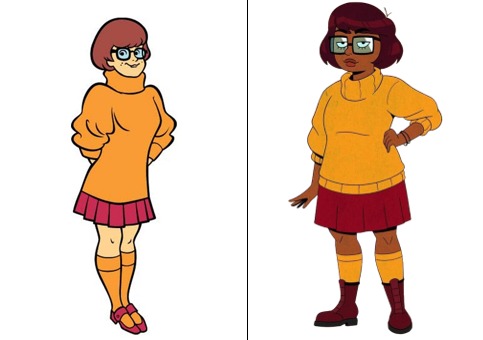Velma Dinkley, the brains behind “Mystery Incorporated”, has faced many changes to her personality, race and romantic interest since her first introduction in 1969, the most resent being from HBOmax spinoff of the original show “Scooby-Doo, Where are Youǃ”, in which the character not only undergoes a radical change in personality but is remade as a South Asian woman and finally canonically lesbian.
Always dresses with orange turtleneck sweaters, skirts, high socks, hills and glasses. The general image of the characters was kept the same to her 1969 version. Since the beginning, Velma has been portrait as the stereotypical nerd, not attractive woman of the group that serves as the counter part for the dumb but beautiful Dafne. According to Sherrie A. Inness (2007), Velma was portrait as “short, dark-haired, and plain” (1). The author mentions that Velma’s portrayal as a brainy woman, with out a sexual allure and constantly overshadow by other characters, made her the one to not be emulated since the smart women in media were negatively depicted, and were generally used to teach the public that in other to achieve social success they need to hide how brilliant they were, as being a “nerd” was heavily stigmatized (1-4). This power over how a certain type of women was perceived had a big impact over “whether women [formed] healthy gender attitudes and beliefs about themselves or other women” (Driscoll, 2002 as cited in Roussell, 2013).
Sine the first appearance of Velma in 1969, the character was depicted as white woman, but recently with HBOmax spinoff the charter has been shown as a South Asian woman. This change comes from Mindy Kaling’s, whose reason behind the change is that: “if I’m voicing her, should she be white or should she not?… It’s animation, we can do anything. The essence of Velma is not necessarily tied to her witness.” (Kaling as cited in Patterson, 2022). Author Victoria Wright (2022) mentions that race bending in character is usually made because the audiences societal and cultural needs and expectations are different form the ones that existed at the start of a show, and with the addition of new perspectives and voices it is inevitable that new interpretations appear (258). But that doesn’t mean that the changes would be all well received. Wright mentions that audiences form para-social connections with the character and often feel like they are friends and share a similar identity. Usually, fandoms would be excited by new interpretations of their favorite characters, as they would be able to grow their connections with them. However, they might still be scared that the new version could ruin the original, as the changes could forever alter the cultural impact of charters, their place in society and the already form para-social relationships, which would leave the fandom feeling disconnected with a character that they previously loved. Still, having a more divers range of characters is beneficial for creating a new connection between characters and a new public (258- 263).
Even when the central traits and appearance of Velma had been fairly similar to the original, one of the aspects of Velma’s persona that was modified, and slightly hinted trough the year, was her sexual orientation. In previous movies and different shows, the character was hinted to be “queer-coded”, which according to Emma Banks (2021) is “[any] set of signals-words, forms, behaviors, signifiers of some kind-that protect the creator from the consequences of openly expressing particular messages.” (23). In the 2001 live action of Scooby-Doo, James Gunn claims to have made the character explicitly gay, but the studio just kept it ambiguous and later erased it completely by giving her a boyfriend in the sequel (Barshad, 2023). The decision of the studio to erase the queerness of Velma comes form the occurrent practice of media to “overlook or misrepresent individuals, whose identities do not conform to traditional categories of gender and sexually, further erasing their experiences and re3inforcing societal norms of conformity” (Tilak, 2024). Then again in 2020, the producer of the animated series Scooby-Dooǃ Mystery Incorporated, stated that Velma was not bi, but gay (Barshad, 2023). This statements from the producer finally made Velma a canonically lesbian character, detail that was kept for the lates spinoff of HBOmax.
As evidenced by image and statements above, the only similarities between the 1969 and 2023 versions of Velma are the iconic orange outfit, since even the personality and stereotypical “nerd” characteristic of the characters were changed in other to make a product that could be relatable and like current shows of HBOmax. In the video by Doctor Wolfula (2023), it’s explained that in the original show Velma was already snarky and sarcastic, but in the 2023 version, they made her into a “misanthropic teen that nearly everyone in the town hates” (5:31), and that “it’s heavily implied that she’s not even smart” (5:43). This changes to the character and essence of the show, weren’t well received by the fandom as it only got a 1.6 out of 10 rating in IMBd (Internet Movie Database). Barshad explains that the issue with the show was not the race bending or intent to address the diversity issues, but rather the way in which they did it, as it was flat and with no real deep (Barshad, 2023).
Bibliography
Banks, Emma. 2021. “’The Hero Does Always Get the Girl’ An Exploration of Queer Representation in Child Centric American Animated Cartoons and Popular Culture with A Case Study on The Legend of Korra.” 10.13140/RG.2.2.17263.56484.
Barshad, A. 2023. “Why Velma Id the Internet’s New Punching Bag”. WIRED. https://www.wired.com/story/velma-hbo-max-internet-backlash/
Doctor Wolfula, 2024. “VELMA (2023) Season 1 REVIEW | The Worst Scooby Show of All Time”. YouTube. https://youtu.be/Z_m_cj6bX_w?si=vRs7bI8wH3Qk6LTt
IMDb. “Velma.” IMDb. Accessed October 28, 2024. https://www.imdb.com/title/tt14153790/
Inness, Sherrie A., ed. 2007. “Geek Chic: Smart Women in Popular Culture.” New York: Palgrave Macmillan. https://books.google.ca/books?hl=es&lr=&id=Z20YDAAAQBAJ&oi=fnd&pg=PP1&dq=Geek+Chic:+Smart+Women+in+Popular+Culture&ots=mlXVgLcBMe&sig=bpflb1FYE8OQkdV37cgkB6fKGmI&redir_esc=y#v=onepage&q=Geek%20Chic%3A%20Smart%20Women%20in%20Popular%20Culture&f=false Libros
Jerry Mouse Island Wiki. “Velma (2023)”. Fandom. https://static.wikia.nocookie.net/jmi/images/c/c9/Velma2023.png/revision/latest?cb=20230424012429
Patterson, A. 2022. “Mindy Kaling Explains The Decision To Change Velma’s Race In HBO Max’s Scooby-Doo Spinoff” CinemaBlend. https://www.cinemablend.com/streaming-news/mindy-kaling-explains-the-decision-to-change-velmas-race-in-hbo-maxs-scooby-doo-spinoff blend
Roussell, Stephanie Ortego. 2013. “An Analysis of Femininity: How Popular Female Characters in the Media Portray Contemporary Womanhood.” Order No. 29122270, Louisiana State University and Agricultural & Mechanical College. https://ezproxy.tru.ca/login?url=https://www.proquest.com/dissertations-theses/analysis-femininity-how-popular-female-characters/docview/2674873216/se-2.
Tilak, G. 2024. “Media Representations of Gender and Sexuality: Challenges and Progress.” Mahratta: Multi-Disciplinary Journal. http://localhost:8080/xmlui/handle/123456789/16932
Wikipedia. 2011. “Velma Dinkley”. Wikipedia https://upload.wikimedia.org/wikipedia/en/9/9d/Velma_Dinkley.png
Wright, V. 2022. “When Your Favorite Characters Alter Their Identities: Implications of Race Swapping in Book to Screen Adaptations on Parasocial Relationships.” Trio McNair Scholars Journal. https://hdl.handle.net/20.500.14220/518


Bri
As some familiar with Velma but not HBOmax’s Velma, the description of her was very clear. Her summary as a nerd stereotype was somewhat fitting but confused me until you added the fact she’s also snarky and sarcastic. It made more sense. Although Daphne isn’t a focus I don’t think the contrast of Velma and Daphne is smart and dumb. Daphne in “Where are you”, “what’s new” and even “Skull Island” was never written as a dumb character so im confused where that came from. Another piece of information that is missing is HBO is not the first POC Velma, while it may be the first to should the culture of the race-bend or be the first animated POC Velma, the first POC Velma was played by Hayley Kiyoko in the live action movie “Scooby-Doo! The Mystery Begins”.
From what’s described the new interpretation of Velma does not seem to fully capture Velma well and I can see why older fans would feel attached to her. Trying to Imagine Velma as a hated, not very intelligent girl seems like it’s the complete opposite of where her character was originally. I fully agree that the failure of her love with older fans would not come from the race change but the change in her whole personality. The one thing besides her outfit that seems to be the recognizable about her is that now she is fully confirmed to be lesbian.
The use of images chosen show the change in the character design, when their body language and facial expression show a difference in character.
Your sources from what I can see seem to be mostly scholarly with usage of some other sources. Tilak’s source link doesn’t work and Patterson’s takes me to their website however the article does not show up.
Bri
(I made a spell mistake)
As some familiar with Velma but not HBOmax’s Velma, the description of her was very clear. Her summary as a nerd stereotype was somewhat fitting but confused me until you added the fact, she’s also snarky and sarcastic. It made more sense. Although Daphne isn’t a focus, I don’t think the contrast between Velma and Daphne is smart and dumb. Daphne in “Where are you”, “what’s new” and even “Skull Island” was never written as a dumb character so I’m confused where that came from. Another piece of information that is missing is HBO is not the first POC Velma, while it may be the first to show the culture of the race-bend or be the first animated POC Velma, the first POC Velma was played by Hayley Kiyoko in the live action movie “Scooby-Doo! The Mystery Begins”.
From what’s described the new interpretation of Velma does not seem to fully capture Velma well and I can see why older fans would feel attached to her. Trying to Imagine Velma as a hated, not very intelligent girl seems like it’s the complete opposite of where her character was originally. I fully agree that the failure of her love with older fans would not come from the race change but the change in her whole personality. The one thing besides her outfit that seems to be the recognizable about her is that now she is fully confirmed to be lesbian.
The use of images chosen shows the change in the character design, when their body language and facial expression show a difference in character.
Your sources from what I can see seem to be mostly scholarly with usage of some other sources. Tilak’s source link doesn’t work, and Patterson’s takes me to their website however the article does not show up.